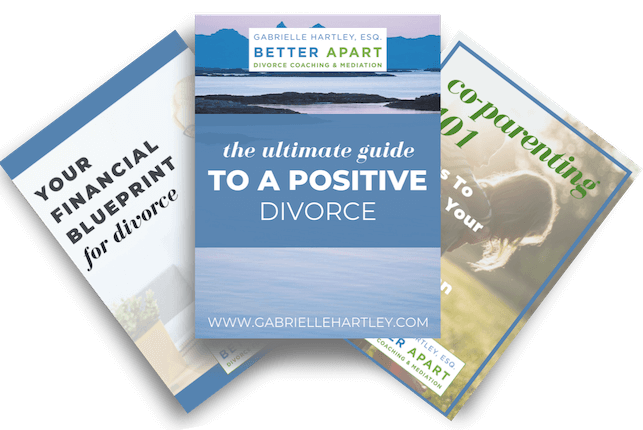Mediation is an option that puts the control of decision-making in the hands of the participants, which is fabulous.
It allows you to create a perfectly tailored agreement with a third party neutral mediator but for some it mediation may not work. Mediation can be more efficient and may cost less than going to trial with attorneys. It’s a wonderful option for people who can do the following:
- Speak to each other in reasonable terms
- Get legal advice first
- Manage their emotions
- Think logically
- Compromise
- Keep positive
Mediation May Not Work
Mediation may sound sweet but in some ways, it’s much harder than going to court and having a Judge make decisions for you. It can be more difficult because it requires the participants to put their emotions aside and think realistically, logically, and most importantly truthfully with a high degree of self-awareness. This is one of the most challenging aspects of family mediation, getting to the level of self-awareness that will allow for compromise. But mediation is not for everyone. Mediation can be much harder than having a Judge make decisions for you. Not everyone is able to engage in the way that is necessary for mediation to be right for them.
Mediation may not work if any of the following are factors:
- One or both people have certain personality disorders or untreated mental illness.
- One or both spouses want to use mediators as Judges or attorneys to teach the law, tell their spouses why they’re wrong, or render decisions
- Participants are not willing to compromise
- One or both participants cannot speak in a respectful manner
- One or both spouses suffer from untreated substance abuse
- One or both spouses has not received legal advice in advance, or has gone to an attorney who incorrectly explains the law

Communication and Compromise are Key
The issues that brought people to the divorce and subsequently mediation become the backdrop to the tone of the communication, and the willingness to compromise. If people have not gone through what I call the Emotional Divorce before starting the legal divorce, the mediation will serve to show them that they aren’t ready to make financial decisions that will last, or co-parenting and child support decisions yet. It’s important to sort out emotions before engaging in the legal filing of a divorce/legal separation/paternity case because the decisions made are permanent and subject to breach if not enacted; we need to be clear about why we’re agreeing to deal points. The only way people can speak to each other in reasonable terms, manage their emotions, think logically, be ready to compromise, and able to show their soon to be ex respect in the negotiated settlement is when they’ve gone through the stages of grief first, the Emotional Divorce.
Mediation and Therapy Work in Tandem
Sometimes, people make the mistake of using mediation as therapy, as an opportunity to voice their emotions, sometimes in a very raw and cruel manner; they want the mediator to act as a therapist and help them get along as people and as co-parents. Mediators are there to move discussions forward, to enable the couple to make financial decisions and co-parenting decisions that will land in the marital settlement agreement. Mediators are not there to manage arguments. Emotions are part of a mediation, but the mediator is charged with moving the discussion forward. But what if people have debilitating personality disorders or diagnosed mental health issues (borderline personality, sociopathic, delusional), can mediation work for them? Depends on the mediator and depends on the mental health condition. Some mediators have training in dealing with personality disorders and know when they’ve reached a point where either mediation is not the right vehicle for settlement, or perhaps with the help of a therapist as a co-mediator, can move the settlement forward. Attorney mediators can also be quite helpful with people with personality disorders if quoting the law will keep the spouses on track. When there is substance abuse, it is absolutely essential that you create a very carefully tailored plan that keeps the best interests of your child front and center. It’s more important than ever to be clear-headed when dealing with substance abuse in the other parent. A good example of making decisions against your child’s best interest is when one parent will agree to joint custody and unsupervised visitation for the other parent even if that parent suffers from substance abuse or aberrant behavior. Just to end the marriage, some parents will agree to anything, even joint custody and unsupervised visitation, not understanding that they are jeopardizing their children’s safety in order to finalize the divorce. In this case, while mediation may work in terms of getting your case to a close, however given the dangers presented when dealing with an alcoholic co-parent, I would say that mediation may not work inasmuch as it can lead to adverse outcomes.
You Can Make Mediation Work
In mediation people can certainly craft their own version of a settlement. If that settlement is based on both people understanding the law, but wanting to do something entirely differently, that’s okay. They are making these decisions with “informed consent”. But if one or both spouses are working in an emotional vacuum and stalemate each other, mediation is over, at least for now. When someone just wants what they want, regardless of the law and without regard to what their soon-to-be-ex wants, mediation may not work. That said, wiith a skilled mediator, you may be able to finesse an agreement but it will take a lot of carefully nuanced give and take. I am a mediator, and I absolutely love mediating, but I always want to be crystal clear that it is not for everyone. If you are not sure if it’s for you or not, ask yourself if you feel clear headed and if you believe your soon-to-be-ex both can be and wish to be reasonable; both for your good, and the future of your family.

Judith Weigle, Amicable Divorce Expert, is a Los Angeles-based Mediator, and Legal Document Preparer with Divorce Resource, Inc.; and podcast host of The Amicable Divorce Expert, a podcast devoted to amicable divorces. IG: mediator_judith; You Tube: The Amicable Divorce Expert with Judith Weigle; Apple podcasts, Google podcasts, iHeart podcasts, Podbean, and Spotify podcasts.

Get Your FREE Divorce Survive & Thrive Kit!
Includes a financial blueprint for divorce, a co-parenting guide, and the BEST strategies to help you stay positive and take care of yourself during divorce and beyond.
[mailerlite_form form_id=2]


Revolutionizing the conversation around Divorce, one internal narrative at a time.
MENU
FOLLOW GABRIELLE
DISCLAIMER: The commentary, advice, and opinions from Gabrielle Hartley are for informational purposes only and not for the purpose of providing legal advice or mental health services. You should contact an attorney and/or mental health professional in your state to obtain advice with respect to any particular issue or problem.
CONTACT GABRIELLE
NORTHAMPTON ADDRESS: 76 Masonic Street, Northampton, MA 01060
NYC ADDRESS: 150 East 52nd Street, Suite 1002, New York NY 10022
STATEN ISLAND ADDRESS: One Edgewater Plaza Suite 304, Staten Island, NY 10305
PHONE: 413.341.0034/ 917.757.0980

